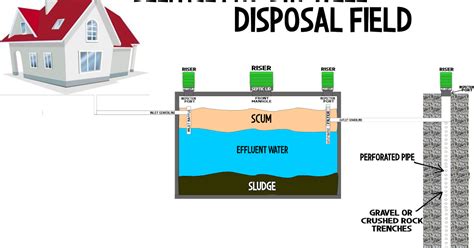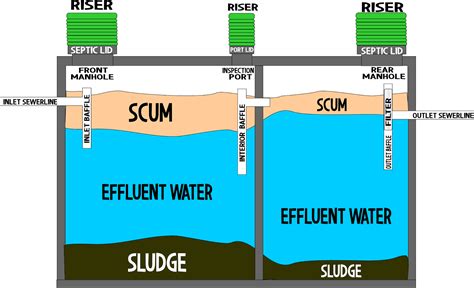Sewage backups typically happen due to various reasons. One common cause is when the septic tank becomes clogged or reaches its maximum capacity. Another possibility is a significant blockage in the main drain line connecting the house to the tank. Additionally, issues with the devices inside the tank can also contribute to sewage backups.
In some cases, the problem may even extend to a failure in the plumbing of the drain field.
How do I stop my septic system from backing up?
Septic system backups can be a major headache, but there are steps you can take to prevent them. First, make sure you’re not overloading your system by conserving water. Fix any leaks and use water-efficient appliances. Regularly pump your septic tank to remove accumulated solids.
Avoid flushing non-biodegradable items like wipes or feminine products. Be mindful of what you put down the drain, as chemicals can disrupt the system’s balance. Consider using septic-safe cleaning products. Finally, be cautious about landscaping near your septic system to prevent root intrusion.
Following these tips can help keep your septic system running smoothly and prevent backups.
What would cause a septic tank to back up?
If you find yourself in a situation where there is an excessive amount of wastewater flowing into your septic tank all at once, you may experience a backup in your septic system. This is commonly referred to as hydraulic overloading. Hydraulic overloading occurs when you are simultaneously engaging in multiple high-volume activities in your home.
What are the signs of a backed up septic tank?
A backed-up septic tank can cause several noticeable signs. One common sign is slow draining or gurgling sounds coming from the drains. You may also notice foul odors coming from the drains or toilets. Another sign is sewage backup, where wastewater starts to come up through drains or toilets.
Additionally, you may see wet spots or standing water near the septic tank or drain field. If you notice any of these signs, it’s important to address the issue promptly to prevent further damage or health hazards. Regular septic tank maintenance and inspections can help prevent backups and ensure the system functions properly.
Why is my septic tank getting full quickly?
If there are cracks in your pipes or septic tank, it can lead to wastewater leaking out of the tank. Additionally, groundwater can seep into the tank, causing it to fill up faster. It’s important to note that damage can also occur if someone accidentally drives over your septic tank, resulting in cracks or breaks. Furthermore, heavy rainfall and standing water can contribute to these issues as well.
Is it bad to pump a septic tank too often?
If you have your septic tank pumped too frequently, the bacteria inside will be forced out into the drain field, causing potential clogs and failures. Therefore, it is actually advantageous to leave your septic tank undisturbed unless the levels of sludge and scum reach specific thresholds. This allows the natural processes within the tank to function properly and maintain a healthy balance.
Why is my septic tank full after 1 month?
Unfortunately, excessive water usage can be a contributing factor to this issue. When the septic system is overwhelmed with a large amount of water all at once, it may not have enough time to properly process and drain the water. As a result, the water can quickly fill up the septic tank, causing it to become full again. This can lead to various problems and potential backups in the system.
Should you flush every time on septic?
Paragraph: “Regular Inspections and Pumping are Essential. It is crucial for homeowners to prioritize the inspection and pumping of their septic systems. According to experts, a septic service professional should inspect the average household septic system at least every three years. Additionally, it is recommended to have the septic tank pumped every three to five years.
These routine maintenance tasks are vital for the proper functioning of septic systems and to prevent any potential issues that may arise. By staying on top of inspections and pumping, homeowners can ensure the longevity and efficiency of their septic systems.” (112 words)
How long should you wait to pump your septic tank?
Regularly pumping your septic tank is essential for maintaining a healthy and functional system. Instead of waiting until you encounter a problem, it is recommended to have your septic tank pumped every three to five years. This proactive approach can help prevent costly issues like a clogged drainfield or sewage backing up into your home. By pumping your tank on a routine basis, you ensure that it operates efficiently and avoids any potential failures.
Don’t neglect this important maintenance task and keep your septic system running smoothly.
Can rain cause septic tank backup?
Heavy rains and flooding can have significant consequences for septic systems, leading to potential issues. In such situations, individuals who do not have access to central wastewater systems should be aware of the necessary precautions to avoid potential sewage contamination.
What is the most common cause of septic system failure?
Most septic systems experience issues due to either improper design or lack of proper maintenance. In certain cases, soil-based systems, which include a drain field, are installed in areas with unsuitable or insufficient soils, steep slopes, or high water tables. These factors can contribute to the malfunctioning of septic systems.
What can mess up a septic system?
Flushing any paper products, such as tissues, paper towels, tampons, or sanitary products, can lead to clogging in your plumbing system if you flush a significant amount of them. Even some thicker toilet paper can cause issues. It’s important to note that wet wipes are also a product that should never be flushed into a septic system.
How long do septic tanks last?
The key to ensuring the longevity of your septic tank is being proactive in its maintenance. With proper care, septic tanks can last for an impressive 30 years or even longer. The primary objectives of a septic tank maintenance program are to prevent the buildup of solids and to avoid any contamination of groundwater. By taking these steps, you can ensure the smooth functioning of your septic system for years to come.
Does a septic tank always stay full?
A septic tank should always be maintained at its normal liquid level, which is typically between 8 to 12 inches from the top of the tank. This level is important because it ensures that the outlet pipe, which carries the effluent to the absorption area, remains submerged. By keeping the tank filled to this level, you can ensure proper functioning and prevent any issues with the septic system.
Can a septic tank last 100 years?
A concrete septic system that is properly designed and constructed can have a lifespan of approximately 40 to 100 years. As long as the pipes remain unclogged and free from corrosion, and the tank is made of high-quality concrete, there are typically no external factors that will diminish its longevity. This means that with proper maintenance and care, a concrete septic tank can provide reliable and long-lasting service for many decades.
How much does a concrete septic tank cost?
Paragraph: “When it comes to septic tanks in Ireland, the average cost for a typical installation is around €1,250. However, it’s important to note that this cost does not include the percolation area and groundworks, which are additional expenses. Typically, these additional components can range from €4,000 to €5,000. So, when budgeting for a septic tank installation, it’s crucial to consider these extra costs to get a more accurate estimate.
“
How quickly should a septic tank drain?
A septic tank with a capacity of 1,000 – 1,250 gallons typically requires approximately 20-30 minutes to be emptied. If the tank is larger, around 1,500 – 2,000 gallons, it will take roughly twice as long, between 45-60 minutes. It’s important to note that the exact duration may vary depending on the company performing the service, the equipment used, and other factors that could influence the process.
Why is my septic tank not draining fast enough?
Slow drains can be a real nuisance, and they are usually caused by obstructions in either a single pipe, the main drainpipe, or even the septic tank. The good news is that the severity of the problem can often give us clues about how to fix it. In many cases, the obstruction is simply a clog in the drain line, which can be caused by various debris like foreign objects, hair, grease, or other items. It’s important to address these obstructions promptly to ensure smooth drainage and prevent any further issues.
How full should a septic tank stay?
A septic tank should always be maintained at its normal liquid level, which is typically between 8 to 12 inches from the top of the tank. This level is important because it ensures that the outlet pipe, which carries the effluent to the absorption area, remains submerged. By keeping the tank filled to this level, the septic system can function properly and effectively treat the wastewater.
Can you run too much water into septic tank?
Flooding the septic tank with an excessive amount of water can disrupt its biological functioning. The US Environmental Protection Agency states that the average water consumption for a person in the United States is approximately 70 gallons per day. This includes activities such as bathing, cooking, flushing the toilet, cleaning, and doing laundry. It’s important to be mindful of the amount of water we use to prevent overwhelming the septic tank and causing potential issues.
Related Article
- Why Is My Sengled Light Unresponsive?
- Why Is My Senetti Plant Dying?
- Why Is My Segway Scooter Beeping?
- Why Is My Securus Account Blocked?
- Why Is My Security Camera Beeping?
- Why Is My Seahorse Blinking Yellow?
- Why Is My Screenshot Blurry Android?
- Why Is My Samsung Refrigerator Humming?
- Why Is My Saltwater Tank Cloudy?
- Why Is My Salt Lamp Melting?


